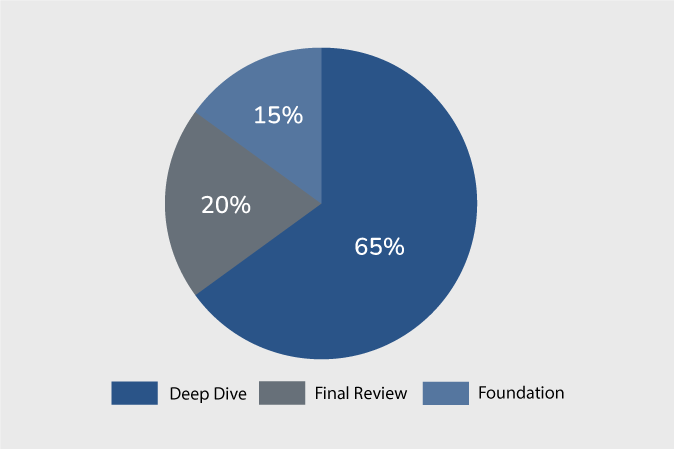Wyoming Bar Exam
(UBE) Details

info
Wyoming Bar Exam information is subject to change without notice. Please verify with the Wyoming State Bar.
Bar Exam Details
A typical Wyoming Bar Exam is a 2-day Uniform Bar Exam (UBE).
Day 1
- Six 30-minute Multistate Essay Exam questions (MEE in the AM)
- Two 90-minute Multistate Performance Test questions (MPT in the PM)
Day 2
- Multistate Bar Exam (MBE), a 200-question, multiple-choice exam (100 questions in the AM, 100 questions in the PM)
Subjects tested
MBE
- Constitutional Law
- Contracts/Sales
- Criminal Law/Procedure
- Evidence
- Federal Civil Procedure
- Real Property
- Torts
MEE
- Business Associations (Agency and Partnership; Corporations and Limited Liability Companies)
- Conflict of Laws
- Family Law
- Trusts and Estates (Decedents' Estates; Trusts and Future Interests)
- Article 9 (Secured Transactions) of the Uniform Commercial Code
- Plus all MBE subjects
MPT
- “Closed universe” practical questions using instructions, factual data, cases, statutes and other reference material supplied by examiners.
MPRE
- A scaled score of 85 is required for admission to the Wyoming Bar Exam.
Click here to learn more about the MPRE.
Scoring
The MEE and MPT scores are scaled to the MBE.
- MBE weighted 50%
- MEE weighted 30%
- MPT weighted 20%
A total scaled score of 270 or higher is required to pass the Wyoming Bar Exam.
Reciprocity
Acceptance of MBE Score
- Wyoming does not accept an MBE score from an exam taken in another jurisdiction.
Admission on Motion
- A member in good standing of a reciprocating jurisdiction may be admitted on motion in Wyoming if the applicant has engaged in the active practice of law for five of the seven years preceding application. Additional requirements apply.
Admission by UBE Score Transfer
- Applicants who have obtained a scaled score of at least 270 on a Uniform Bar Exam taken in another jurisdiction within the preceding three years may apply for admission based on that score. Additional requirements apply.
BARBRI Bar Exam Digest
We compile all of the information that you need to know about the dates, format, subjects tested, deadlines, fees and more - for each U.S. state - in the free BARBRI Bar Exam Digest.

Sample Schedule: Uniform Bar Exam Course Information
BARBRI Bar Review uses best-in-class learning design to help you master complex material quickly and improve retention for test day. Your course is tailored to your unique needs, and broken into three phases: Foundations, Deep Dive, and Final Review.
This overview does not list all assignments that will be available in your Personal Study Plan (PSP). Your PSP adjusts to your strengths, weaknesses, and schedule, offering a customizable calendar with recommended assignments to boost your chances of passing.
PSP access for Premium and Elite courses begins in mid-March for July exams and mid-October for February exams. Though your calendar is customizable, BARBRI’s default schedule begins at the same time Essentials courses open: Mid-May and Mid-December, respectively.
Foundations 15%
Covers multistate subjects
- “About” videos
- These short videos explain efficient and effective ways to navigate the exam and the course
- Short story-driven episodes on core concepts across each mbe subject.
- Skills workshops
- Knowledge checks and warm-up essays
Deep Dive 65%
Covers multistate and essay subjects
- Short-format lecture modules
- Taught by expert professors.
- Reading, practice, assessment and reinforcement through review
- Knowledge checks and practice essays additional essay and performance
- Test writing skills instruction
- Simulated Multistate Bar Exam
- Simulated Written Exam
Final Review 20%
- Crunch time with Mini Review lectures, the Conviser Mini Review book and multiple choice and essay practice
Subject Sequence
- Civil Procedure
- Torts
- Criminal Law
- Criminal Procedure
- Evidence
- Constitutional Law
- Contracts
- Real Property
- Performance Test
- Wills
- Trusts
- Agency
- Partnership
- Corporations
- Secured Transactions
- Conflict of Laws
- Family Law